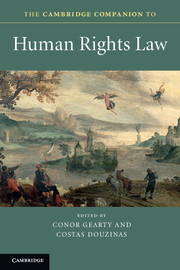Book contents
- Frontmatter
- Contents
- Preface
- Notes on contributors
- Acronyms and abbreviations
- Introduction
- Part I All kinds of everyone
- Part II Interconnections
- 4 Foundations beyond law
- 5 The interdisciplinarity of human rights
- 6 Atrocity, law, humanity: punishing human rights violators
- 7 Violence in the name of human rights
- 8 Reinventing human rights in an era of hyper-globalisation: a few wayside remarks
- Part III Platforms
- Part IV Pressures
- Index
- References
5 - The interdisciplinarity of human rights
from Part II - Interconnections
Published online by Cambridge University Press: 05 December 2012
- Frontmatter
- Contents
- Preface
- Notes on contributors
- Acronyms and abbreviations
- Introduction
- Part I All kinds of everyone
- Part II Interconnections
- 4 Foundations beyond law
- 5 The interdisciplinarity of human rights
- 6 Atrocity, law, humanity: punishing human rights violators
- 7 Violence in the name of human rights
- 8 Reinventing human rights in an era of hyper-globalisation: a few wayside remarks
- Part III Platforms
- Part IV Pressures
- Index
- References
Summary
The subject of this chapter is the interdisciplinarity of the study of human rights, and not of the rights themselves, like freedom of expression or right to health care, in the abstract. A study like this can apply to such matters as the subjective meaning of the right as experienced by the people who claim it and the context in which it is exercised. In my view, however, the study of all aspects of human rights should be for the purpose of informing and facilitating the practical implementation of these rights, rather than as a purely academic exercise. It would therefore follow that the interdisciplinarity of the study of human rights should be directed at guiding policies and struggles for the protection of human rights. As an approach to the study of human rights, reference to interdisciplinarity addresses such questions as what it is, what does it do, and what does it add to disciplinarity and multi-disciplinarity? In other words, the title of this chapter raises questions about the relationship among disciplinarity, multi-disciplinarity and inter-disciplinarity, that is, how are these concepts related yet different, and what each of them means for the study of human rights in ways that are conducive to effective and sustainable implementation of these norms around the world.
A primary concern with any discourse of human rights is to what extent is it, or can it be, as globally inclusive as possible because that is the nature of the subject. As I will explain later, human rights must be by definition universal, if they are to be at all, because they are supposed to be the entitlements of all human beings, equally and without distinction. In other words, the human rights project may be doomed to failure for whatever reason, but if it is to succeed at all, it must be about the universal rights of all human beings. This project has been resisted for a variety of reasons when it was first proposed in the aftermath of the Second World War, and continues to attract strong scepticism. For those like myself who do believe in the necessity and possibility of the universality of human rights, the inquiry would be about what does this belief mean and require, whether in theoretical or conceptual terms, or as a matter of political, legal and cultural practice.
- Type
- Chapter
- Information
- The Cambridge Companion to Human Rights Law , pp. 97 - 113Publisher: Cambridge University PressPrint publication year: 2012



